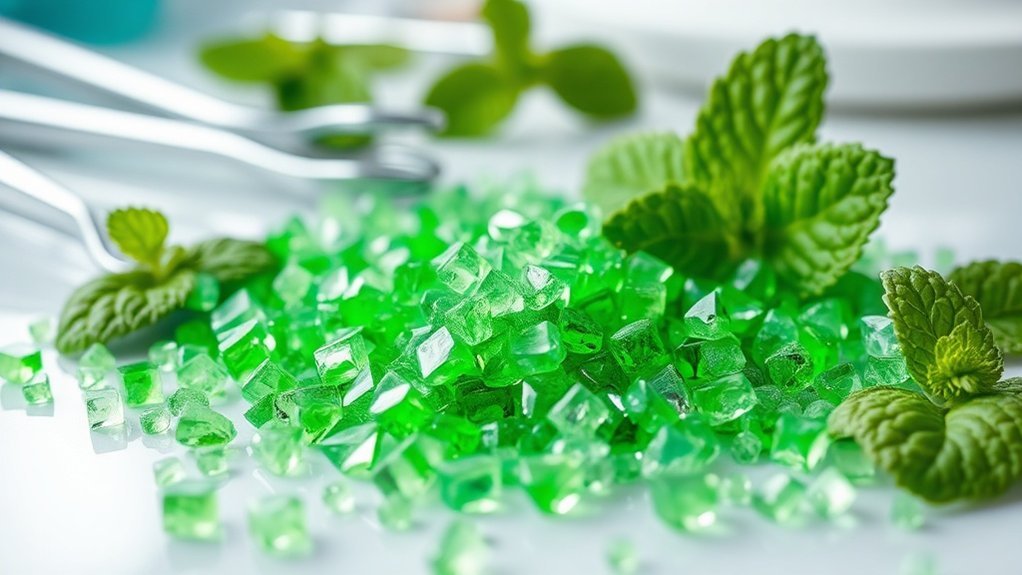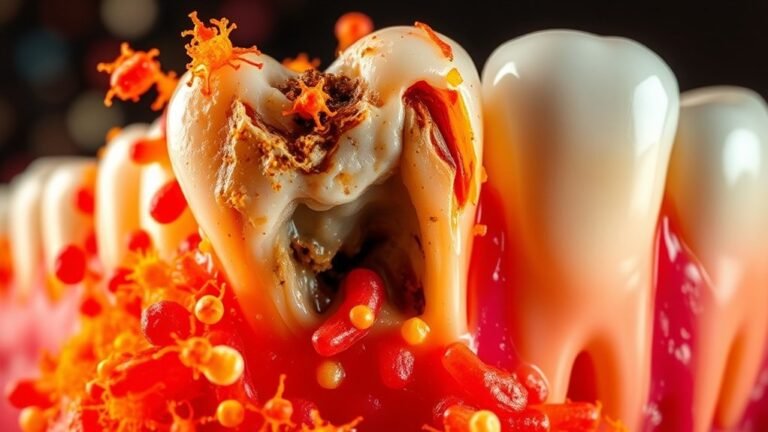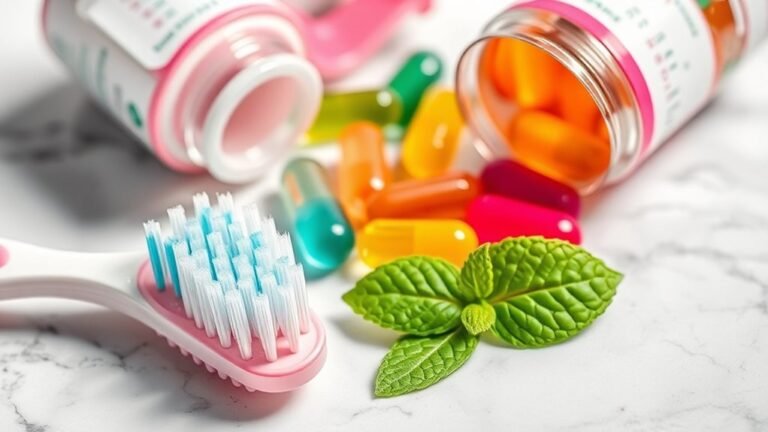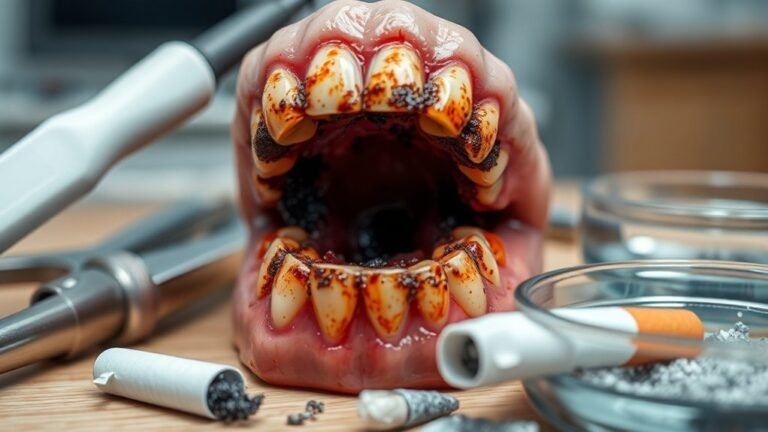Chewing Xylitol Reduces Streptococcus Mutans and Cavity Risk
Chewing xylitol gum greatly reduces levels of Streptococcus mutans, the bacteria responsible for tooth decay, which lowers your cavity risk. Xylitol disrupts the metabolism of these harmful bacteria, resulting in less acid production and reduced plaque formation. Clinical studies reveal that regular xylitol intake can lead to a remarkable decrease in cavities, as it also stimulates saliva production and aids in enamel remineralization. Discover more about the benefits and usage of xylitol for ideal dental health.
Key Takeaways
- Chewing xylitol gum significantly reduces levels of Streptococcus mutans, a primary bacteria responsible for tooth decay.
- Xylitol inhibits the growth and metabolism of harmful bacteria, decreasing acid production that erodes tooth enamel.
- Regular xylitol consumption leads to a notable reduction in cavities, with studies showing up to a 50% decrease in dental caries.
- Xylitol stimulates saliva production, enhancing oral health by neutralizing acids and aiding in the remineralization of enamel.
- Incorporating xylitol into daily routines, like gum and toothpaste, supports a healthier oral environment and reduces cavity risk.
What Is Xylitol?
Xylitol, a sugar alcohol found naturally in various plants, is increasingly recognized for its dental health benefits. When you chew xylitol chewing gum, you’re not just freshening your breath; you’re actively participating in tooth decay prevention. Research indicates that xylitol helps reduce cavity risk by inhibiting the growth of harmful bacteria, particularly Streptococcus mutans, which is a primary contributor to tooth decay. Unlike traditional sugars, xylitol doesn’t ferment, meaning it doesn’t produce acids that can erode tooth enamel. Regular consumption of xylitol can lead to a decrease in plaque formation and an overall improvement in oral health. By integrating xylitol into your daily routine, you can effectively lower your chances of developing cavities and maintain a healthier smile.
The Role of Streptococcus Mutans in Tooth Decay
Streptococcus mutans, a key player in the oral microbiome, markedly contributes to the development of tooth decay. This bacterium metabolizes sugars, producing acids that demineralize tooth enamel, leading to cavities. Its ability to form biofilms on tooth surfaces creates a protective environment, allowing it to thrive despite oral hygiene efforts. You might be surprised to learn that the reduction of streptococcus mutans is vital for improving dental health. Studies show that lower levels of this bacterium correlate with a decreased risk of cavities. Implementing effective strategies to minimize its presence, such as dietary modifications and good oral hygiene, can greatly enhance your dental health and reduce the likelihood of tooth decay. Understanding this relationship is essential for effective preventive care.
How Xylitol Works Against Harmful Bacteria
When you chew xylitol, you actively inhibit the growth of harmful bacteria like Streptococcus mutans, which is essential for reducing cavity risk. This sugar alcohol disrupts the bacteria’s ability to metabolize sugars, leading to less acid production and a more balanced pH level in your mouth. As a result, xylitol not only curbs bacterial proliferation but also helps maintain a healthier oral environment.
Inhibition of Bacterial Growth
As you chew xylitol, it actively interferes with the growth of harmful bacteria in your mouth. Xylitol inhibits the metabolism of Streptococcus mutans, the primary bacteria responsible for tooth decay. Research indicates that when this bacteria attempts to utilize xylitol as a sugar source, it fails to thrive, thereby reducing its population. Additionally, xylitol disrupts bacterial adhesion to tooth surfaces, limiting their ability to form plaque. Studies show that regular xylitol consumption can lead to a significant decrease in cavity-causing bacteria. By promoting a less favorable environment for harmful microbes, xylitol effectively lowers the risk of tooth decay. This evidence supports xylitol’s role as a powerful tool in maintaining oral health and preventing cavities.
Ph Balance Restoration
Maintaining a balanced pH in your mouth is essential for oral health, and xylitol plays a significant role in this process. When you chew xylitol, it helps neutralize acids produced by bacteria such as Streptococcus mutans. These bacteria thrive in acidic environments, contributing to tooth decay. Xylitol promotes saliva production, which is vital for buffering these acids and restoring pH levels. Saliva not only washes away food particles but also contains minerals that aid in remineralizing enamel. Research indicates that regular use of xylitol can lower the overall acidity in your mouth, creating an unfavorable environment for harmful bacteria. By incorporating xylitol into your oral hygiene routine, you effectively support pH balance and reduce your cavity risk.
Clinical Studies Supporting Xylitol’s Efficacy
Research consistently highlights xylitol’s antimicrobial properties, showing its effectiveness in reducing cavity-causing bacteria. In various clinical studies, participants who chewed xylitol gum exhibited a significant decrease in dental caries compared to those who did not. These findings provide compelling evidence for incorporating xylitol in preventive oral care.
Xylitol’s Antimicrobial Properties
While many sweeteners contribute to dental decay, xylitol stands out due to its unique antimicrobial properties. This natural sugar alcohol not only sweetens but also disrupts the metabolism of harmful bacteria, particularly Streptococcus mutans, which is a primary contributor to tooth decay. Here are three key ways xylitol demonstrates its efficacy:
- Inhibits Bacterial Growth: Xylitol prevents the growth of cavity-causing bacteria, reducing their presence in the mouth.
- Reduces Acid Production: Unlike traditional sugars, xylitol doesn’t ferment, leading to lower acid production that erodes enamel.
- Promotes Saliva Flow: Increased saliva neutralizes acids and assists in remineralizing tooth enamel, enhancing overall oral health.
These properties make xylitol a valuable ally in cavity prevention.
Study Results Overview
Numerous clinical studies have demonstrated the efficacy of xylitol in reducing cavity risk, showcasing its potential as a preventive measure in dental care. Research indicates that individuals who chew xylitol gum experience a significant decrease in Streptococcus mutans, a primary bacteria responsible for tooth decay. In one study, participants chewing xylitol exhibited a 50% reduction in cavities compared to those using conventional sugar-containing gum. Another trial revealed that consistent xylitol use led to alterations in salivary composition, enhancing its protective effects against decay. In addition, long-term studies suggest that daily xylitol consumption can sustain lower levels of cavity-causing bacteria. Collectively, these findings reinforce xylitol’s role as an effective tool for promoting oral health and reducing the risk of cavities.
Benefits of Chewing Xylitol Gum
Chewing xylitol gum offers several significant benefits for oral health, particularly in reducing cavity risk. By incorporating xylitol into your daily routine, you can actively combat harmful bacteria and promote a healthier mouth. Here are three key benefits:
- Reduces Streptococcus mutans: Xylitol inhibits the growth of this cavity-causing bacteria, lowering your risk of tooth decay.
- Stimulates Saliva Production: Increased saliva helps neutralize acids and wash away food particles, further protecting your teeth.
- Strengthens Enamel: Xylitol contributes to remineralization, making your enamel more resilient against future decay.
Other Sources of Xylitol
Xylitol isn’t just found in gum; it occurs naturally in various foods and can be sourced from specific plants. For instance, you’ll find xylitol in small amounts in fruits like strawberries, raspberries, and plums. Additionally, vegetables such as cauliflower and mushrooms also contain this sugar alcohol. Birch trees and corn cobs are primary sources for commercial production, where xylitol is extracted and refined. Research shows that these natural sources contribute to dental health benefits similar to those of xylitol gum, as they can help inhibit the growth of Streptococcus mutans. Incorporating these foods into your diet not only adds flavor but also supports oral health without the need for excessive sugar intake.
Recommended Daily Intake of Xylitol
Often, maintaining an ideal daily intake of xylitol can greatly enhance your dental health. Research suggests that consuming 6 to 10 grams of xylitol daily can effectively reduce levels of Streptococcus mutans, the bacteria linked to cavities.
To achieve this, consider the following strategies:
- Chew xylitol gum: Opt for gum that contains at least 1 gram of xylitol per piece and chew 2-3 pieces after meals.
- Use xylitol-based products: Incorporate xylitol toothpaste or mouthwash into your daily oral hygiene routine.
- Enjoy xylitol snacks: Look for snacks, like candies or mints, specifically formulated with xylitol.
Potential Side Effects of Xylitol
While xylitol is often praised for its dental benefits, it can lead to gastrointestinal distress in some individuals, especially when consumed in large amounts. You should also be aware that allergic reactions, although rare, can occur. Understanding these potential side effects is vital for making informed choices about xylitol use.
Gastrointestinal Distress Potential
Although xylitol is frequently praised for its dental benefits, it can lead to gastrointestinal distress in some individuals. If you’re considering incorporating xylitol into your diet, be aware of potential side effects. Here are three common issues:
- Bloating: Many people experience abdominal swelling after consuming xylitol, which can be uncomfortable.
- Gas: Xylitol may ferment in the gut, leading to increased gas production, which can be bothersome.
- Diarrhea: Ingesting large amounts of xylitol can have a laxative effect, causing diarrhea in sensitive individuals.
It’s essential to monitor your body’s response if you choose to use xylitol regularly, as tolerance can vary markedly among individuals. Moderation is key to minimizing these gastrointestinal disturbances.
Allergic Reactions Considerations
Have you ever considered that xylitol, despite its many benefits, might trigger allergic reactions in some individuals? While xylitol is generally recognized as safe, some people report hypersensitivity or allergic responses. Symptoms can include itching, swelling, and gastrointestinal discomfort. These reactions may stem from a pre-existing allergy to birch or other sources of xylitol, as most xylitol is derived from birch trees or corn. It’s crucial to monitor your body’s response when introducing xylitol into your routine, especially if you have a history of food allergies. If you experience any adverse effects, it’s wise to consult a healthcare professional. Understanding these potential side effects guarantees you can enjoy xylitol’s benefits while minimizing any allergic risks.
Tips for Incorporating Xylitol Into Your Diet
Incorporating xylitol into your diet can be a straightforward way to enhance dental health and reduce cavity risk. Here are three effective ways to include xylitol in your daily routine:
- Chewing Gum: Opt for sugar-free gum that contains xylitol. Chew it after meals to stimulate saliva production, which helps neutralize acids in your mouth.
- Baking Substitute: Replace sugar with xylitol in your baking recipes. It can be used in a 1:1 ratio, allowing you to enjoy your favorite treats without the cavity risk.
- Xylitol Mints: Keep xylitol mints handy for a quick oral hygiene boost throughout the day. They’re easy to carry and offer a revitalizing way to combat bacteria.
The Future of Xylitol in Dental Health
As research continues to explore the benefits of xylitol, its role in dental health is poised for significant advancements. Studies indicate that xylitol not only reduces levels of Streptococcus mutans—an essential contributor to cavities—but also enhances the remineralization of enamel. By incorporating xylitol into daily routines through chewing gum or lozenges, you could actively lower your cavity risk. Future innovations may include xylitol-infused dental products, offering more targeted applications in oral hygiene. Additionally, ongoing clinical trials are likely to provide deeper insights into ideal dosages and formulations. As evidence mounts, dental professionals may soon advocate for xylitol as a foundational component of preventive care, reshaping how you approach oral health and cavity prevention.
Frequently Asked Questions
Can Children Safely Use Xylitol Products for Dental Health?
Yes, children can safely use xylitol products for dental health. Research indicates that xylitol helps reduce harmful oral bacteria, promoting healthier teeth. However, consult your pediatric dentist to determine appropriate usage and dosage for your child.
How Does Xylitol Compare to Regular Sugar for Oral Health?
Xylitol’s lower fermentability compared to regular sugar means it doesn’t feed harmful bacteria. It promotes saliva flow, helping to neutralize acids. Consequently, it’s a healthier choice for maintaining your oral health and reducing cavity risks.
Are There Any Specific Brands of Xylitol Gum Recommended?
You’ll find brands like Spry, XyloBurst, and Epic are popular choices for xylitol gum. They’re well-regarded for their quality and effectiveness in promoting oral health, so consider trying one of these options for better dental care.
Can Xylitol Help With Bad Breath?
Yes, xylitol can help with bad breath. It reduces bacteria that cause odor, promotes saliva production, and creates a healthier oral environment. Regularly incorporating xylitol into your routine could greatly improve your breath freshness.
Is Xylitol Safe for Pets, Particularly Dogs?
Xylitol isn’t safe for dogs; it can cause insulin release, leading to hypoglycemia and potential liver failure. If your pet ingests xylitol, contact a veterinarian immediately. Always keep xylitol-containing products out of their reach.
Conclusion
Incorporating xylitol into your daily routine can greatly reduce your risk of cavities. Studies show that regular use can lead to a 30-50% reduction in Streptococcus mutans levels, the primary bacteria linked to tooth decay. By chewing xylitol gum or using it in your diet, you’re not just enjoying a sweet treat but actively fighting harmful bacteria in your mouth. As dental health continues to evolve, xylitol’s role could become even more prominent in preventive care strategies.






